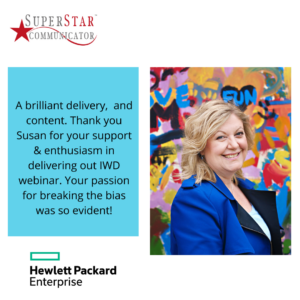Here are five ways to break the bias. In March 2022, the theme for International Women’s Day was #breakthebias. During the month of March I delivered multiple virtual workshops, virtual speeches and masterclasses to attendees from all over the world. The organisations included Multi-national companies; associations, public sector organisations and charities. And I am delighted there were men as well as women at these events. Everyone was challenged. If you would like a copy of our Break the Bias Ebook, grab it here.
Based on the content of the workshops, here are 5 ways you could immediately break the bias and make better decisions when selecting suppliers; recruitment and promotion.
- Be aware that everyone has biases: Everyone categorises others based on how they look; age, physical appearance, race, etc. We make these decisions subconsciously in less than a second. The trouble is that we base these on previous experiences; our own values; how we were brought up etc. The most important thing is to recognise that EVERYONE has biases.
- understand why we have unconscious bias: Our brains have to deal with up to 35,000 decisions every day. No way can we process all of these consciously, so the brain filters many of these decisions subconsciously. And some of these decisions are based on stereotypes; “Gut Feelings” or “instincts” rather than evidence. Once we are aware of the limitations of unconscious bias and the danger that we could be making poor decisions then we can start changing this.
- Look at the stereotypes and beliefs you have and how they might be impacting your decision making: It is always a very useful exercise to see where we have biases and stereotype beliefs. This could be related to race, age, sex. There are individuals who will openly not employ women of childbearing age “Because they will go off and have babies” even though there is little concrete evidence of this. Or “I won’t employ anyone from Birmingham because they are all lazy” – yes I have actually had that said to me; I am originally from Birmingham. Start being aware of these stereotypes; why you have these and how they might not be true.
- Consider how you could make informed decisions rather than ‘instinct’ decisions: We live in a world where decisions have to be made quickly. Could you change this? Could you go back to a decision and reflect on it?
- How could you influence others at work to make conscious, informed decisions? This is a key part of the workshops we deliver. It is all very well discussing unconscious bias and stereotyping but until we all do something about this to consciously change our decision making, nothing will change. Do you challenge decisions made in your organisation? Do you have two people make a decision so that this could reduce the risk of unconscious bias? What could you suggest?
Here at SuperStar Communicator, we deliver a range of Break the Bias workshops, virtual workshops, speeches and masterclasses. We would love to deliver these to more organisations world wide.
I would be delighted to arrange a call with you to discuss the content and how we could work with you.



 Case Study: Building Credibility
Case Study: Building Credibility